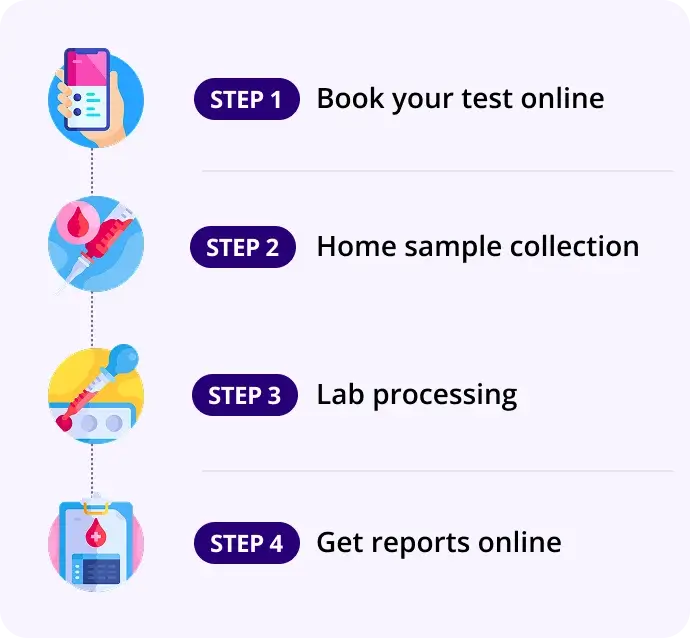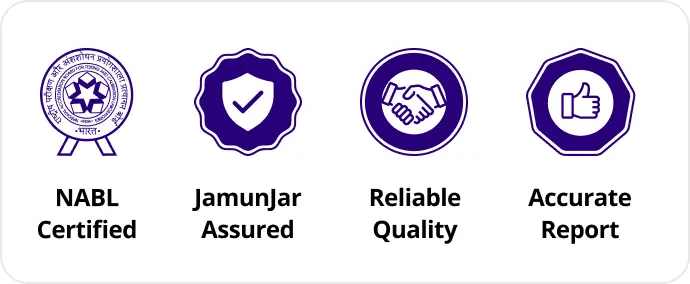Search for
Helicobacter Pylori Antigen detection by - Stool
Bacterial/ Viral
Report in 48Hrs
At Home
No Fasting Required
Details
Detect the presence of Helicobacter pylori (H. pylori) antigens in a stool sample.
₹1,680₹2,345
28% OFF
FREE:
Ai Insights
Helicobacter Pylori Antigen Detection by Stool - Comprehensive Medical Test Guide
- Why is it done?
- Test Purpose: Detects Helicobacter pylori (H. pylori) antigens in stool samples to identify active bacterial infection in the stomach and small intestine
- Primary Indications: Diagnosing H. pylori infection in patients with peptic ulcer disease, chronic gastritis, or gastrointestinal symptoms; screening high-risk populations; confirmation testing after treatment
- Clinical Scenarios: Patients presenting with abdominal pain, bloating, nausea, vomiting, or dyspepsia; post-treatment verification to confirm eradication; initial screening in endemic regions
- Advantages of Stool Testing: Non-invasive collection method; no need for endoscopy; high sensitivity and specificity; suitable for all age groups including children; cost-effective compared to invasive procedures
- Normal Range
- Normal Result: Negative or Not Detected
- Abnormal Result: Positive or Detected (typically reported as qualitative result)
- Units of Measurement: Qualitative (Positive/Negative); some laboratories may report semi-quantitative results (1+, 2+, 3+) indicating antigen concentration levels
- Interpretation Guide: Negative = No H. pylori antigen detected; indicates absence of active infection or successful treatment. Positive = H. pylori antigen detected; indicates active bacterial infection requiring treatment
- Reference Range Definition: Normal is defined as the absence of detectable H. pylori antigens in stool. Any detection of antigen is considered abnormal
- Interpretation
- Positive Result Meaning: Indicates active H. pylori infection; bacteria are present in the stomach and upper gastrointestinal tract; patient requires antimicrobial treatment; high sensitivity and specificity (>95% for both); can indicate recent infection or persistent infection if previously treated
- Negative Result Meaning: No H. pylori antigen detected; suggests absence of active infection; indicates successful treatment if performed post-therapy; very low likelihood of active disease
- Semi-Quantitative Results (if applicable): 1+ = Low antigen concentration (light infection); 2+ = Moderate antigen concentration; 3+ = High antigen concentration (heavy infection); higher values may correlate with greater bacterial load
- Factors Affecting Results: Proton pump inhibitors (PPIs) and bismuth compounds may reduce antigen detection; recent antibiotic use can cause false negatives; timing of collection relative to infection onset; sample quality and proper handling; laboratory methodology variations
- Clinical Significance: Positive result warrants treatment with triple or quadruple therapy; patient education on infection transmission required; family screening may be recommended; post-treatment testing (at least 4 weeks after completion) confirms eradication
- Result Patterns and Implications: Persistently positive after treatment = treatment failure, consider resistance testing; conversion from positive to negative = successful eradication; negative in symptomatic patients = consider alternative diagnoses
- Associated Organs
- Primary Organ Systems Involved: Gastrointestinal system; specifically stomach (gastric mucosa), duodenum, and distal ileum; can affect esophagus and gastroesophageal junction in advanced cases
- Associated Conditions and Diseases: Peptic ulcer disease (gastric and duodenal ulcers); chronic atrophic gastritis; gastric adenocarcinoma (intestinal type); mucosa-associated lymphoid tissue (MALT) lymphoma; functional dyspepsia
- Common Clinical Manifestations: Abdominal pain and cramping; bloating and early satiety; nausea and vomiting; loss of appetite; weight loss; halitosis (bad breath); iron deficiency anemia (from chronic bleeding)
- Potential Complications: Perforation of peptic ulcer (medical emergency); gastric perforation; severe hemorrhage; chronic anemia; gastric outlet obstruction; gastric cancer development; MALT lymphoma progression
- Secondary Organ Involvement: Liver may be involved in severe cases; increased gastric acid secretion affecting esophageal mucosa; immune system activation affecting various systems
- Follow-up Tests
- Post-Treatment Verification Tests: Repeat stool antigen test (minimum 4 weeks post-treatment completion); urea breath test (non-invasive); H. pylori serology (IgG antibodies persist longer); endoscopic biopsy with culture if treatment failure suspected
- Complementary Diagnostic Tests: Serum H. pylori IgG antibodies (supports diagnosis); upper endoscopy with biopsy (gold standard for diagnosis); histopathology examination; rapid urease test; PCR testing for resistance mutations
- Associated Laboratory Tests: Complete blood count (detect anemia); iron studies (assess iron deficiency); fecal occult blood test (identify chronic bleeding); pepsinogen levels (assess gastric atrophy)
- Imaging and Procedural Follow-up: Upper gastrointestinal endoscopy (visualize ulcers, gastritis); abdominal imaging if complications suspected; endoscopic ultrasound (assess MALT lymphoma)
- Monitoring Frequency: Initial diagnosis: baseline stool antigen test; post-treatment: confirm eradication 4 weeks after therapy completion; if eradicated: no routine monitoring needed; if treatment failure: repeat testing after alternative regimen; symptoms recurrence: repeat testing as clinically indicated
- Additional Investigations for Complications: CT scan (perforation, obstruction); endoscopic therapy evaluation; gastric pH monitoring; esophageal manometry (if reflux suspected)
- Fasting Required?
- Fasting Requirement: No - Fasting is NOT required for stool antigen testing
- Sample Collection Instructions: Collect stool sample directly into provided container without contamination from toilet water or urine; use a clean, dry container; collect adequate sample (typically 5-10 grams or as directed); label properly with patient identifiers; refrigerate if transport is delayed
- Medications to Avoid (Timing Considerations): Proton pump inhibitors (PPIs) - discontinue 2 weeks before testing if possible; H2-receptor antagonists - discontinue 1 week before testing; Bismuth compounds - discontinue 2 weeks before testing; Antibiotics - discontinue 4 weeks before testing; NSAIDs - avoid concurrent use
- Optimal Testing Conditions: Perform testing at least 4 weeks after completion of H. pylori treatment (for confirmation testing); avoid collection during acute diarrhea (may interfere with results); morning stool sample preferred; avoid any laxatives 3 days before collection unless medically necessary
- Special Patient Preparation: Communicate medication list with healthcare provider; no dietary restrictions; normal activities allowed; ensure understanding of proper collection technique; contact laboratory if unsure about collection procedure; provide detailed instructions to patient before home collection
- Sample Handling and Transport: Keep sample refrigerated at 2-8°C if not tested immediately; transport to laboratory within 24 hours; maintain proper temperature chain during transport; avoid freezing unless specified by laboratory; clearly mark biohazard label
How our test process works!

